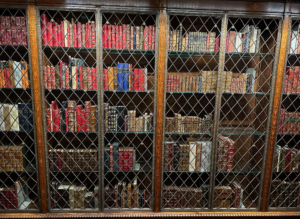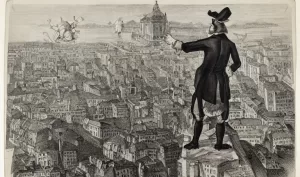The Best Way to Fuel Your Writing Career: Find Dead Mentors
“I wouldn’t be writing the way I write now if I hadn’t read Lewis Carroll. And I wouldn’t be writing the way I write now if I hadn’t read James Joyce…All writers have mentors.” -Joyce Carol Oates
Books are portals into the minds of the most creative and thoughtful people throughout history.
You may not be able to ask Charles Dickens how to portray the differences between social classes, but you can crack open Oliver Twist or A Christmas Carol and pull up a chair at a dining table bereft of meat. You can’t grab a drink with Ernest Hemingway, but you can learn as much by reading his work as he could ever teach you over a martini.
I’m a big advocate of mentorship, and I’ve benefited from the wise advice of several mentors during critical stages in my life. But one of the benefits of mentorship is that you can learn from anyone — alive or dead.
Anyone who inspires you and makes you a better writer can become a mentor. Just like Joyce Carol Oates credits authors like Lewis Carroll and James Joyce for teaching her what she knows, you can choose your own mentors and dive deep into their work.
“Reading is the springboard to writing,” says Oates in her MasterClass on writing short stories. “What you read and with what intensity you read is going to determine probably what you write because all human beings are imitative.” Even though you’re not striving to imitate anyone else, you’ll likely end up parroting another writer’s voice.
In college, David Sedaris’s writing professor applauded one of Sedaris’s stories as being an excellent parody of Raymond Carver’s work. The problem was that Sedaris hadn’t set out to write a parody. He had unwittingly copied Carver’s writing style because he had been reading a lot of Carver’s work. And you know what? That’s okay. It’s perfectly natural. That’s one of the reasons why it’s important to find great literary mentors: Their words will eventually come out of your pen.
“After you’ve written 10,000 words, 30,000 words, 60,000 words, 150,000 words, a million words, you will have your voice, because your voice is the stuff you can’t help doing,” says Neil Gaiman.
Before you reach your million words, you’ll inevitably end up copying the style of other writers. For now, don’t worry about that. Focus on discipline and constant improvement. Your style will find you.
Elizabeth Gilbert says she learned more about plotting and characterization from Charles Dickens than from any living writer. “All I had to do in order to learn from Dickens was to spend years privately studying his novels like they were holy scripture, and then to practice like the devil on my own,” writes Gilbert.
Gilbert says no one needs a Master of Fine Arts degree (MFA) to write. You can learn from the best writers in the world by exploring the shelves of your local library or bookstore. A $20 book can sometimes take you further than a $5,000 class. Reading the work of talented authors fills you with words that will mysteriously ooze out of you at the right moment.
“Do you want to study under the great teachers? Is that it? Well, you can find them anywhere,” writes Gilbert. “They live on the shelves of your library; they live on the walls of museums; they live in recordings made decades ago. Your teachers don’t even need to be alive to educate you masterfully.”
Anyone who has followed my work for a while knows that I’m a huge fan of Ryan Holiday. Holiday is my same age and he’s already accomplished so much, so it would be easy to hate him for his success.
But instead I’ve decided to view Holiday as a mentor. He’s taught me more than almost any other author, and I will eagerly purchase any new book he publishes. I’ve not only read all of his books (some of them twice), but I’ve also begun to read the authors he cites as his influences: Marcus Aurelius, Cal Newport, Anne Lamott, etc.
My goal is not to write like Holiday but to think like him.
I want to learn how to make connections between historical events and current events, apply ancient principles to modern-day life, and help readers feel inspired while helping them focus on the hard work needed to make any desired change in their life. These are all things that Holiday does well, and I want to gradually learn how to think more like him.
Your mentor may be Herman Melville, Jane Austen, Sylvia Plath, or Haruki Murakami.
Whoever that person is, become intimately familiar with their oeuvre. Get inside their head. Read what they read. If they’ve already passed away, read a biography about their life. If they’re still alive, subscribe to their email newsletter, pre-order their new books, and attend their book talks.
Obsess over your mentor’s work and let them teach you how to become a stronger writer.




